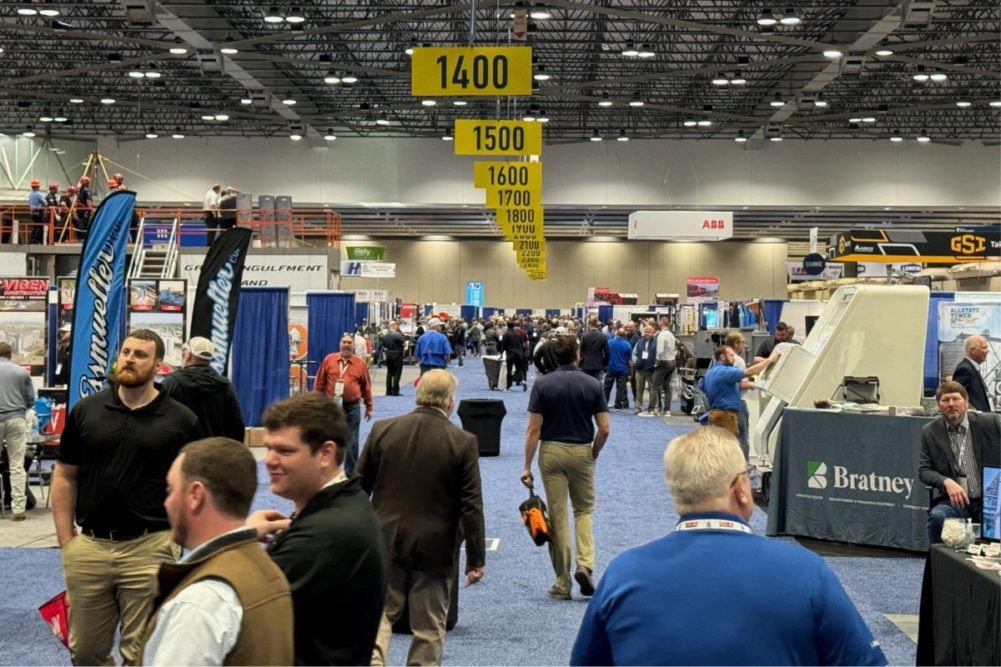KANSAS CITY, MISSOURI, US — GEAPS Exchange 2024 will be one for the history books, and John Caupert, the new executive director of the Grain Elevator and Processing Society (GEAPS), couldn’t be more pleased.
“We’re shattering a number of records this week,” said Caupert, who was hired in November 2023 to lead the organization. “We don’t have the final numbers yet on attendance, but I can comfortably say we’re going to be north of 3,500 attendees, which will be a record. The Expo is completely sold out with nearly 400 here. We had a waiting list of nearly two dozen, so that provides opportunity for growth and expansion. We have 45 hours of breakout sessions; that’s the most in history.”
Last year’s Exchange drew 3,333 attendees and more than 360 exhibitors.
The expo floor was buzzing with activity and most of the educational sessions were standing room only as GEAPS members met in Kansas City’s Bartle Hall Convention Center for the three-day event, which wraps up on Feb. 27.
With its central location, Kansas City will be the location of the annual event through at least 2029.
“Kansas City is such a welcoming city,” Caupert said. “The other thing that Kansas City offers is affordability for that potential attendee that’s on the fence of whether I can go or not. Why? More than 50% of all US agricultural products are produced within driving distance of Kansas City.”
This year’s event features four education tracks — maintenance, employee development, safety and grain operations — designed to meet the needs of grain professionals. One of those sessions centered on how change and the reaction to it impacts organizational and individual performance.
A four-member panel discussed how adapting to change in areas such as technology, safety and the environment can mean the difference between a thriving and failing business.
Jim Voigt, president of JFV Solutions, who has been part of the grain industry for more than four decades, noted that change is being driven by customers of commercial grain storage and handling companies on both sides of the supply chain.
“We have farmers and producers as our customers, and we also consider the feed lots, feed mills and food companies as customers,” he said. “Sometimes they have competing demands for changes that we have to address.”
Today, the grain industry is experiencing the ripple effect of changing attitudes as far down the line as the consumer, Voigt said.
“One of the changes we’ve had to address is that consumers are more worried about food safety, food security and sustainability,” he said. “That’s going to drive change at the back end of the supply chain that we’re going to have to react to.”
During his career, Voigt has seen countless changes transform the commercial grain elevator industry. Most notably, storage and handling capacity has ballooned to levels that could not have been imagined several decades ago. Also, consolidation over the last 30 years has led to fewer companies having control of the majority of grain storage capacity in the United States.
“The biggest change historically has been the growth and advancement in farmers’ ability to produce and deliver grain to our facilities,” Voigt said. “Producers have forced us to have bigger legs, bins and dryers.”
Marcus Neal, owner of MN Agsolutions LLC, added that the industry’s attitude toward safety has changed (for the better) over the past 10 to 15 years.
“Back then, I would be at facilities where guys were wearing flip-flops and shorts while dumping trucks,” Neal said. “Today, everybody would freak out if they saw something like that. Even at small, locally owned facilities, stuff like that doesn’t occur like it used to.”
Perhaps the most dramatic change in recent years has been the technological developments that have affected every aspect of commercial grain storage and handling. All the panelists agreed that embracing artificial intelligence (AI) and other cutting-edge technology is necessary to maintain a thriving business.
Doug Clingman, chief technology officer, Central Valley AG, said not embracing AI could have disastrous consequences for companies.
“All industries will have to leverage AI as part of their business,” Clingman said. “It won’t replace people but rather be a companion to them. Organizations need get out in front of it and figure out how to utilize AI.”
One aspect of change that all companies — not just those in the grain industry — are grappling with is the different set of work values and attitudes that Generation Z (people born since 1997) views as important. Neal said companies must listen to their younger employees rather than dismissing them.
“There’s that attitude of: ‘If it’s not broke, don’t fix it.’ But it doesn’t have to be broke to improve it,” Neal said. “It doesn’t have to be broke to make it better than what it is today. You either have to embrace that idea or you’re going to be left behind.”
On the same topic, Voigt added: “We have to be willing to change how we do business. If we fight it, we’re not going to win.”



